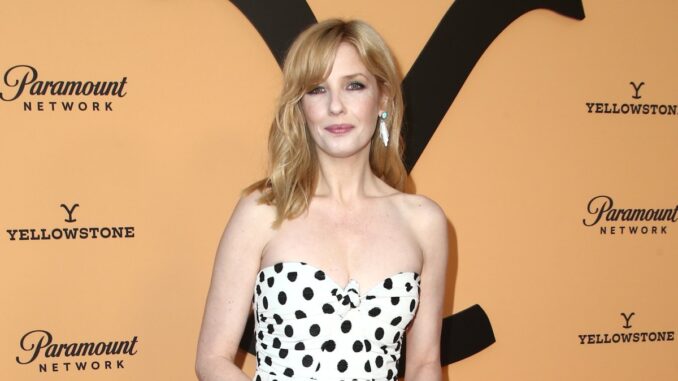
The Unfurling of a Wildfire: Kelly Reilly on Yellowstone’s Final Season and Beth Dutton’s Unwritten Future
Beth Dutton doesn’t walk into a room; she explodes into it, leaving a trail of scorched earth and hushed reverence in her wake. She is a tornado in a designer coat, a venomous rose, a character so ferociously carved from the heart of the Yellowstone ranch that she feels less like a fictional creation and more like a force of nature. As the dust settles on the penultimate chapter and the final season looms, the spotlight inevitably turns to the woman who breathes such terrifying, intoxicating life into Beth: Kelly Reilly. Her reflections on the impending end and the enigma of Beth’s future offer a poignant glimpse into the soul of one of television’s most iconic figures.
For Reilly, portraying Beth has been an odyssey, a deep dive into the raw, unvarnished core of human emotion. Interviews and insights over the years reveal an actor deeply, almost spiritually, connected to her character’s pain, her unwavering loyalty, and her strategic, often brutal, brilliance. As the final season begins to spool out, Reilly likely navigates a landscape of conflicting emotions. There’s the professional satisfaction of concluding a saga that has captivated millions, the camaraderie of a cast and crew who have become family, and undoubtedly, a poignant melancholy at bidding farewell to a character who has lived within her for so long. She’s not just playing Beth; she has become the vessel through which Beth’s fire rages, her vulnerability surfaces, and her devastating wit cuts through the Montana air.
The challenge of the final season, Reilly would implicitly understand, isn’t just to deliver a good performance, but to deliver the performance that solidifies Beth’s legacy. Every scene is imbued with a heightened significance, every line a potential epitaph. The pressure to encapsulate the sprawling, contradictory essence of Beth Dutton – her love for Rip, her protective fury over her father, her pathological hatred for Jamie, and her profound grief over a stolen motherhood – must be immense. Reilly, with her unflinching commitment, will undoubtedly lean into this with the same intensity Beth brings to a boardroom massacre or a barroom brawl.
And what of Beth Dutton’s future? This is the question that hangs heavy in the rugged Montana air, a narrative cliffhanger that has haunted fans since the first season. Reilly has often spoken of Beth’s survival instinct, her feral determination to protect what she loves, and her capacity for immense pain. These traits offer tantalizing clues but no clear answers.
One path for Beth, perhaps the most anticipated, is a cataclysmic victory. Her war with Jamie has transcended sibling rivalry, evolving into a primal, existential conflict. For Beth to achieve a semblance of peace, Jamie must be vanquished, irrevocably and utterly. Reilly’s portrayal of Beth’s vengeful spirit is electrifying; her steel gaze and whiskey-soaked voice delivering threats that feel more like promises. The final season could see Beth orchestrate Jamie’s downfall, cementing her role as the undisputed protector of the Dutton legacy, albeit through scorched-earth tactics. This ending would satisfy the bloodlust she has cultivated, offering a brutal catharsis for years of torment.
Yet, a life of perpetual vengeance offers little solace. Beth’s profound love for Rip Wheeler is her anchor, her only consistent source of unconditional acceptance and peace. Reilly has masterfully depicted the softer, deeply vulnerable side of Beth that only Rip can unlock. Can Beth, the architect of chaos, ever truly find domestic tranquility with her cowboy? The dream of their small cabin, their quiet life away from the ranch’s venomous politics, is a recurring motif. Reilly knows this is where Beth’s heart yearns. Will the final season allow for this hard-won peace, even if it’s imperfect and constantly threatened? Will Beth finally choose love and a semblance of normalcy over the relentless fight, or are those two desires mutually exclusive for her?
Then there’s the poignant, unresolved grief of her infertility, a wound Jamie inflicted that never truly healed. Beth’s fierce maternal instinct, often misdirected or sublimated into her protection of Tate or even her father, hints at a longing that defines much of her character. Could the final season offer an unexpected form of motherhood, a way for Beth to nurture and protect without having borne children herself? This would be a radical departure from her usual narrative arc, but one that could offer profound emotional closure for both Beth and Reilly, who has so viscerally embodied that particular pain.
Ultimately, the future of Beth Dutton, as perhaps even Reilly herself acknowledges, lies in the masterful hands of Taylor Sheridan. He has a penchant for subverting expectations, for delivering endings that are raw, uncompromising, and deeply true to his characters, not necessarily to audience desires for neat bows. Reilly, as the embodiment of Beth, will be the conduit for whatever fate Sheridan has decreed. She will navigate the final storms, whether they lead to her triumph, her sacrifice, her fleeting peace, or perhaps, a tragically poetic demise that cements her as the ultimate martyr for the Yellowstone ranch.
As the final curtains prepare to fall, Kelly Reilly’s portrayal of Beth Dutton stands as a testament to the power of a character who is both monstrous and magnificent, terrifying and tender. Her understanding of Beth’s complex soul promises that the final season will not just wrap up a storyline, but truly unfurl the last, defining chapters of a wildfire that has burned bright and fierce, leaving an indelible mark on the landscape of television and in the hearts of its devoted audience. The anticipation isn’t just for what happens, but for how Reilly, with every fibre of her being, will bring Beth Dutton’s unforgettable saga to its blazing, inevitable close.
